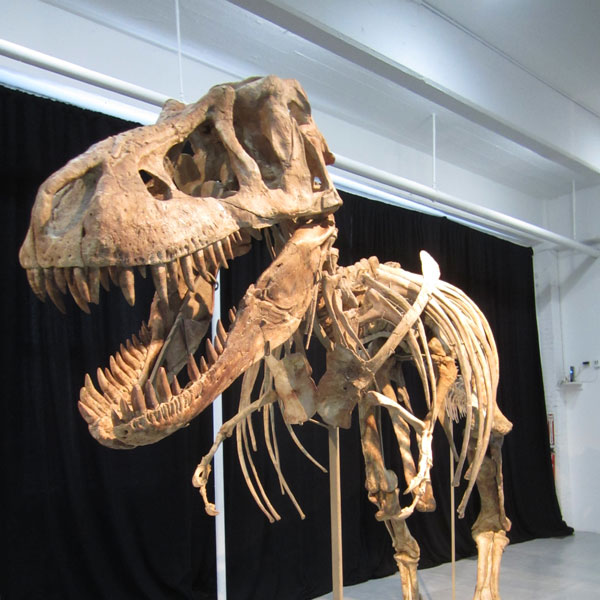Fossil Dealer in Disputed Dinosaur Case Arrested

Federal officials have arrested a Florida fossil dealer who is embroiled in an ownership dispute over a dinosaur skeleton, charging him with crimes related to a scheme to illegally import dinosaur fossils into the United States.
The dealer, Eric Prokopi, was arrested this morning (Oct. 17) at his home in Gainesville, Fla., the Manhattan U.S. Attorney has announced.
The U.S. Attorney had earlier filed a civil claim on the skeleton of a T-rex-like dinosaur known as a Tarbosaurus bataar, which Prokopi attempted to sell at auction earlier this year. The Mongolian President Elbegdorj Tsakhia interceded saying the fossils were almost certainly taken illegally from his country, a claim that has been supported by paleontologists.
Now the legal battle has moved into criminal territory. In the statement, U.S. Attorney Preet Bhararareferred to Prokopi as a "a one-man black market in prehistoric fossils."
The U.S. Attorney's office is accusing Prokopi of smuggling fossils, including the Tarbosaurus, into the United States, from Mongolia and China, countries that do not allow the export of vertebrate fossils. The feds are alleging that Prokopi falsely described the imports on customs forms and sold stolen goods. [Album: A Tarbosaurus Travels from Auction to Court Room]
According to court documents filed by the U.S. Attorney, Homeland Security seized one of these specimens, a small, four-winged dinosaur called a Microraptor from China in 2010 because of false statements on customs documentations. Another skeleton, which court documents say Prokopi sold to California-based gallery and auction house I.M. Chait, belonged to a species of duck-billed dinosaur called a Saurolophus angustirostris.
This duck-billed dinosaur, like the Tarbosaurus, almost certainly came from a single rock formation that is exposed only in Mongolia, said Mark Norell, a paleontologist at the American Museum of Natural History, who works in Mongolia.
Get the world’s most fascinating discoveries delivered straight to your inbox.
The charges against Prokopi also include those related to the sale of two other dinosaurs native to what is now Mongolia, according the U.S. Attorney's office.
One of Prokopi's attorneys in the civil case, Peter Tompa, declined to comment on the criminal charges, saying Prokopi needs to retain a defense attorney.
With regard to the Tarbosaurus civil case, Tompa and co-counsel Michael McCullough have argued that Mongolian law is inaccessible to Americans like Prokopi and that it is ambiguous on the ownership of fossils.
They have also disputed the Mongolian origin of the Tarbosaurus, pointing out that fragmentary remains have shown up in other countries.
As for allegations Prokopi made false statements on customs forms for the Tarbosaurus, McCullough and Tompa have maintained there is no clear guidance available on what information to provide on these forms. For instance, there is no clear definitive definition of "country of origin," which Prokopi listed as Great Britain for the Tarbosaurus fossils, they said.
In an interview conducted earlier this month, Tompa and McCullough declined to comment specifically on a September court order directing the feds to seize the duck-billed dinosaur from I.M. Chait, but Tompa said this: "I don't know that the fact they have decided to seize another dinosaur they think is Mongolian has any relevance to this, except it shows they are on some kind of crusade."
I.M. Chait has not responded to requests for comment.
Prokopi is charged with one count of conspiracy to smuggle illegal goods, possess stolen property, and make false statements. He is also charged with smuggling goods into the United States, and interstate sale and receipt of stolen goods.
Follow LiveScience on Twitter @livescience. We're also on Facebook & Google+.



